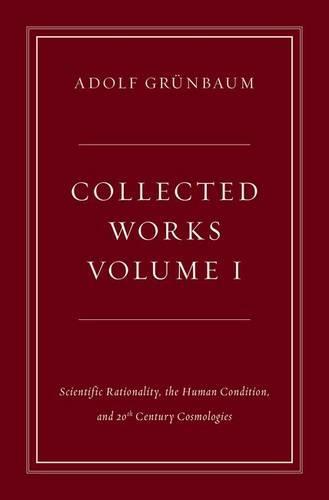Overview
Adolf Grünbaum is one of the giants of 20th century philosophy of science. This volume is the first of three collecting his most essential and highly influential work. The essays collected in this first volume focus on three related areas. They discuss scientific rationality-the problem of what it takes for a theory to be called scientific, and ask whether it is plausible to draw a clear distinction between science and non-science as was famously proposed by Karl Popper. They delve into the debate between determinism and indeterminism, in both science and in the humanities. Grünbaum defends the position of the Humane Determinist, which then leads to a thorough criticism of the current theological approaches to ethics and morality-where Grünbaum defends an explicit Secular Humanism-as well as of prominent theistic interpretations of twentieth century physical cosmologies. The second volume is devoted to Grünbaum's writings on the Philosophy of Physics and Space-Time, and the third to his lectures on the Philosophy of Psychology and Psychoanalysis, including his 1985 Gifford Lectures, which are to be published for the first time.
Full Product Details
Author: Adolf Grünbaum (Andrew Mellon Professor of Philosophy of Science, Andrew Mellon Professor of Philosophy of Science, University of Pittsburgh)
Publisher: Oxford University Press Inc
Imprint: Oxford University Press Inc
Dimensions:
Width: 23.60cm
, Height: 2.80cm
, Length: 16.30cm
Weight: 0.539kg
ISBN: 9780199989928
ISBN 10: 0199989923
Pages: 304
Publication Date: 12 September 2013
Audience:
Professional and scholarly
,
Professional & Vocational
Format: Hardback
Publisher's Status: Active
Availability: To order

Stock availability from the supplier is unknown. We will order it for you and ship this item to you once it is received by us.
Reviews
Clearly written, rich in content, well-argued, and insightful, this is a masterful collection of essays that should find its way onto the reading list of all those interested in scientific rationality, free will, secular humanism, and theistic cosmology. --The Review of Metaphysics Any attempt to understand the professional and academic development of philosophy in the second half of the 20th century, especially in the United States, rather requires an understanding of Grunbaum and his work. --Notre Dame Philosophical Reviews In the philosophical world, Grunbaum is a man of immense stature. He is arguably the greatest living philosopher of science. --Jim Holt, in Why Does the World Exist?
Any attempt to understand the professional and academic development of philosophy in the second half of the 20th century, especially in the United States, rather requires an understanding of Grunbaum and his work. --Notre Dame Philosophical Reviews
Author Information
Adolf Grünbaum is Andrew Mellon Professor of Philosophy of Science at the University of Pittsburgh, as well as co-chairman of its Center for Philosophy of Science (since 1978), Research Professor of Psychiatry (since 1979), and Primary Research Professor in the Department of History and Philosophy of Science (since 2006). He is the author of 15 books, including this 3-volume collection of his papers and lectures, as well as around 400 articles in journals and books




